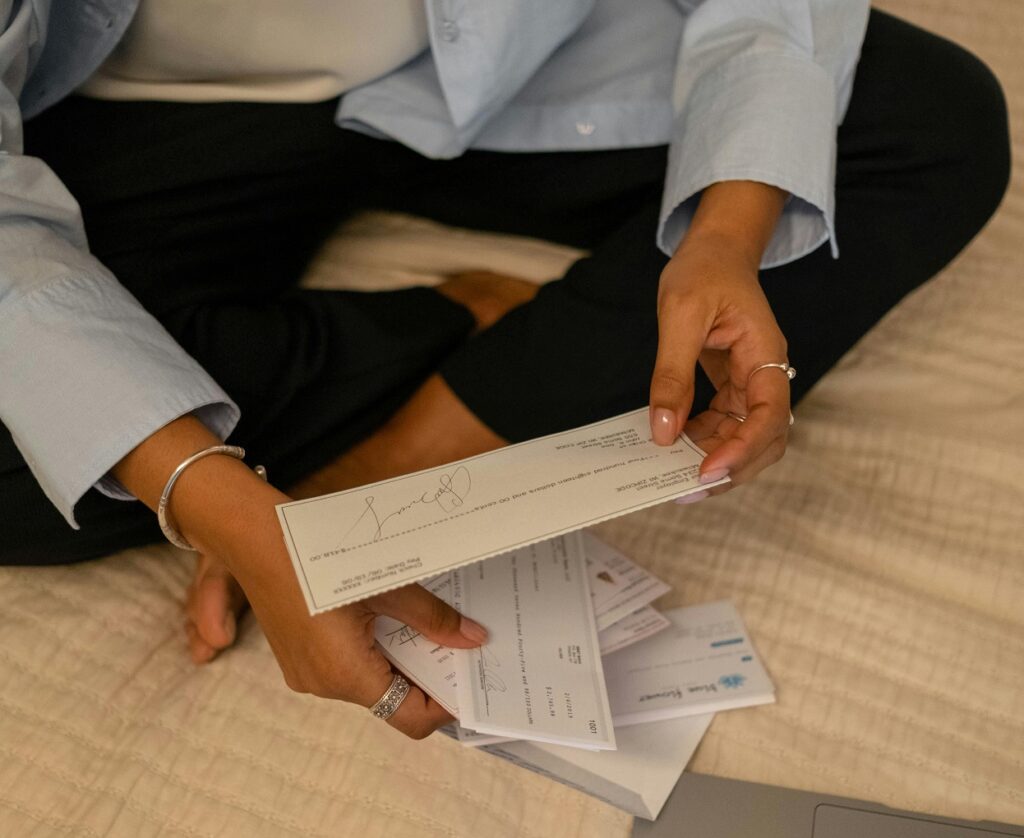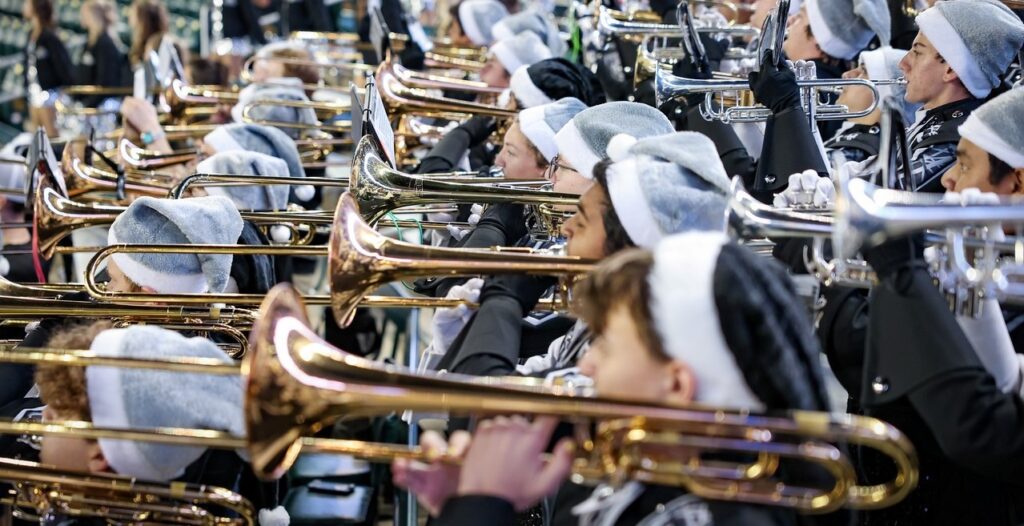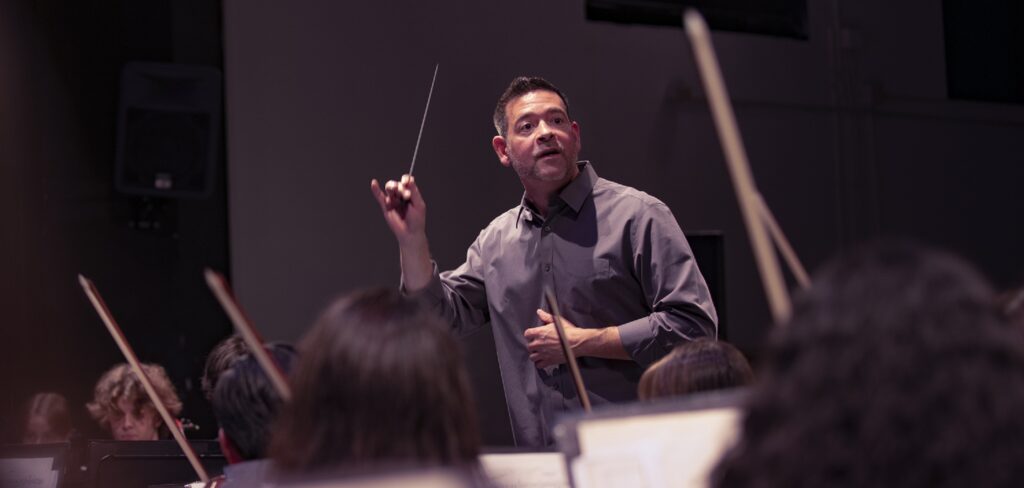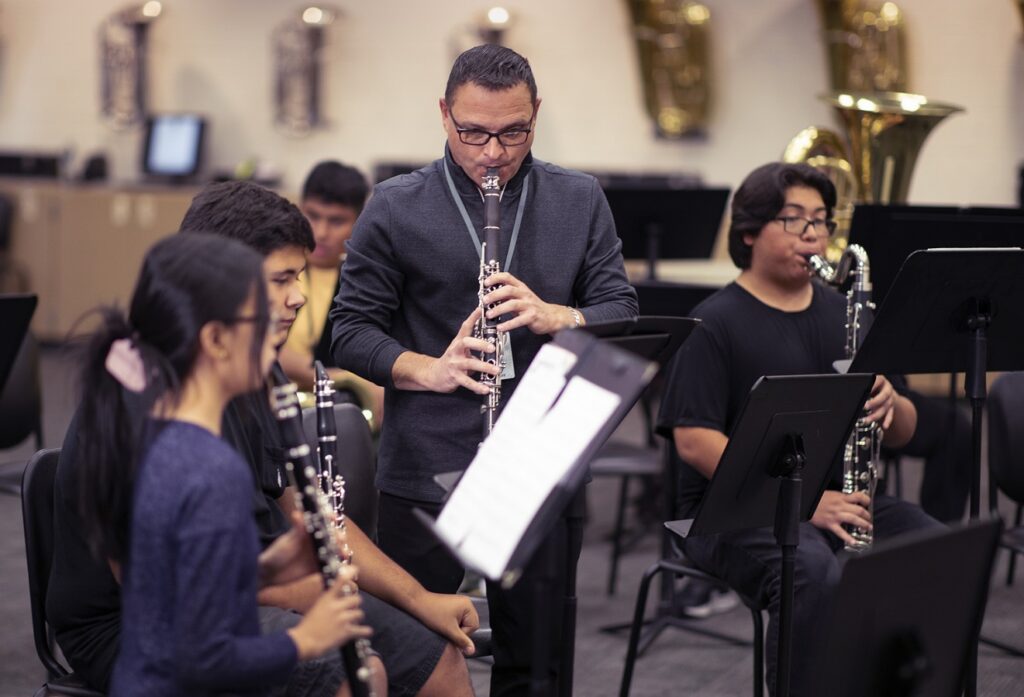Tagged Under:
Don’t Get Trapped by “The Checklist”
Rethink the conventional checklist that most music educators try to follow and explore alternative, enriching paths to success for both you and your students.
Many music educators subscribe to a success checklist. You’re not worthy until you’ve completed the gauntlet.
Swap these milestones with ones that are relevant to your discipline:
- State-Level Recognition: Your group must be accepted for the state music organization festival, but only in concert band, concert choir and concert orchestra. You know, the “legitimate” areas.
- Auxiliary Ensembles: Once you’ve earned a spot at state, you can then consider your auxiliary ensembles, or “non-legit” ensembles, such as jazz, madrigals, chamber orchestras or vocal jazz. You’ll get a smaller room to perform in, but hey, it’s a plaque that says you got there! (Note: this does not apply to marching band. See the next point).
- Competitive Milestones: If you have a marching band or show choir, you then must begin placing at contests. You can start at small shows, but then you must move on to a state show. Not that “state” show; the other state show.
- Next-Level Aspirations: You will then go back to your concert ensemble and explore a number of other options that will instantly be recognized as the “next” level. They should have “National” in their name. If a “World” or “Galaxy” exists, or even “Omniverse,” consider skipping straight to this.

- Individual Achievements: I hope you haven’t forgotten about your individual musicians! If a state district level exists, this is just the first step. Also, you must get more than two students in — one just doesn’t cut it. Also, at least one or two must go to state. Also, you must do this at the same time as marching band. Also, if you teach choir, triple the number of students you are expected to have at district and state. In fact, only program the district and state pieces with your ensemble.
- Organizational Politics: If you teach middle school, you are OK to go to the grade school association contests. But if you teach high school, you may be looked down upon if you attend the state education associations version of a music contest (does not apply to Texas and Indiana). Pull out of these organizations as soon as possible, and if you can’t, begrudgingly participate at the lowest possible level while continuing to try to convince your administration that the “real” organization for music is the other one.
- Networking but Not Really: Attend your state and national music festivals. Look people right in the nametag and then determine whether you give them your eyes or keep walking. Note: carefully peel off your “performer” ribbon from previous years and stick on your current badge. They must not forget what you’ve done!
- The Commission: If selected for a state or national honor, you must commission a work for one of your events. You may or may not ever play this work again, but it must be commissioned and your name must be on the music.
- The Cycle: Completed everything? Rinse and repeat. You’re only as good as your last major success! Oh yeah, and don’t forget about the kids. Let them have a pizza party or something.
- Do All This in 10 to 15 Years: If these items don’t occur within your first 15 years of teaching, you will be an utter failure, a late bloomer or the dreaded “you know, they’re a nice person.”
Now imagine going back and doing The Checklist over again, but this time you should be able to do it all at once. Those who don’t or can’t do this? “Well, they’re just collecting a paycheck.” “They used to be good — what happened to them?”
Maybe some music educators did get lazy. And, maybe those who did complete The Checklist aren’t so bad. It’s those who do The Checklist expecting it to offer them some inner peace and sanctum who may come up empty-handed. The Checklist varies according to your location, discipline and expectations.

The Illusion of Prestige
So, you’re not a part of the club who has their ensemble selected for something. Is this really a tragedy? Why do these milestones become our identity? The irony is, often we only realize how trivial these achievements are after we’ve accomplished them.
“It’s not about the trophy, kids! I can say that because we already got the trophy!” As with most major projects and journeys, the “why” matters. On the one hand, some of the more successful programs have teachers who have followed The Checklist journey and as a result have programs that have flourished. The students and teachers utilized The Checklist to reach a set standard and then replaced this competitive model with what they deemed to be more worthwhile performances. In other words, these programs evolved.
But what about those who seemingly can’t escape the competitive grind? First, we must look at what hidden traps occur when we carelessly chase and repeat The Checklist as a cycle.
Chasing Validation Over Substance: The allure of prestigious events and awards can sidetrack educators from the core purpose of teaching: enriching students’ lives through music. But hey, those trophies look really nice in the office!
Limited Perspective: Strict adherence to The Checklist may narrow an educator’s view, overlooking non-traditional or less recognized but equally enriching paths in music education. Some teachers state they attend different contests or festivals regularly, but if the goal and intention remain the same, we are just swapping out a location.

Burnout: Trying to achieve every milestone on The Checklist can be exhausting and may lead to professional burnout, diminishing both your music program and you.
Resource Drain: Focusing solely on achieving checklist milestones often requires significant financial and time investment, which could be used for more individualized, beneficial educational experiences. The resources required to complete The Checklist may not be equally accessible for all schools or communities. There’s just not enough money or time in many cases.
Neglected Innovation: The pressure to conform to established norms can stifle creativity and discourage educators from experimenting with new teaching methods or musical styles. Guidelines can be helpful and encouraging, but pushing to the next level is also rewarding. Music theory one: learn the norms. Music theory two: learn how to break the norms and have a little more fun!
Student Disengagement: An unwavering focus on prestige can make students feel like mere steppingstones for the teacher’s career goals rather than individuals with their own musical journeys.
Overemphasis on Competition: Some may see The Checklist as a strictly competitive mindset. Competition is necessary. Chances are if you are reading this, you had to compete for the position you are in by applying and interviewing for your job. Our students must compete to understand at least a base level of preparing and meeting a standard. Yet, competitive opportunities can be balanced with a collaborative, community-based learning environment.
Exclusivity: Achieving milestones on The Checklist can sometimes rely on gatekeeping and politics, creating an environment where only certain types of programs or students get opportunities.

Lost Joy: The pressure to tick off items from a predefined list can sap the joy and spontaneity of teaching and making music for educators and students alike. That’s right: It’s OK to focus on having some joy. If we are only happy when we are getting applause or recognition, we may have some reflecting to do.
Are you feeling called out? Good. But let’s get one thing straight: If The Checklist pumps you up, go for it! But if it makes you feel less than, or you’re contemplating a career pivot, give yourself the freedom to explore other paths. But most importantly, ask why?
I’m not demonizing these organizations or their checklists. What I am challenging is this almost cult-like mindset that you’re worthless if you don’t accomplish all these things. And why are we all so desperate for external validation? Is that really what all the applause has done to us? If our program is on the chopping block, I get it: save it by any means possible and show the powers that be that the outside experts (anyone who’s out of town) value us. But if we’re trophy hunting and just collecting plaque after plaque and chasing the high, maybe our priorities are out of whack.
Job Descriptions and Blank Slates
Many districts aren’t so regulated when it comes to music program expectations. In the case of music program requirements, think of them this way: your job description is the minimum of what you must uphold. It’s not a restriction. Does your contract say “five home football games and three concerts?” Sounds like an endless amount of possibility, a blank slate if you will.
Make a New Checklist
The Checklist is not inherently bad. It can help improve your program. But it’s not the “be-all and end-all.” There are alternative ways to build up your groups and enrich your students’ experiences. So, if you are feeling like an outsider looking in, let it go. Consider your checklist. Strip away the current expectations. If alternative approaches are necessary, where can you start?
What does success look like for your groups? This is a crucial question. We are not asking “what is easiest for our kids to achieve” or “what contests could my kids go and win?” Rather, this is an important first step in turning intentions around. If the current intentions are for the teacher’s gain, we are looking at intentions being shifted to a new checklist — a checklist that focuses on desirable student outcomes. And what are these desirable student outcomes? Those are for you to find out with your program — after all, you know your kids, school and community best. Below are a few samples of some possible events but be careful of turning this into the “anti-competitive director checklist” (there is always some other trap, isn’t there?).
Host Guest Artists and Clinicians: Invite guest artists to conduct workshops, masterclasses or collaborative performances. This enriches your program and offers students valuable mentorship opportunities. Invite clinicians to work with your group — even if you aren’t heading to a festival! This will hands-down be one of the most effective things you can do to promote musical growth in you and your ensemble. In my time, I’ve had professional trumpet players, clarinet players, local community bands, vocalists and even a frame drummer from Syria perform with my groups.
Invite Groups for Home Concerts: Similar to above, but this time, the guest group is the main event. Bring in groups to perform specialized concerts at your school. This provides a unique and intimate performance experience and can even feature your students as opening acts. You may have seen some groups do this with service bands or well-known vocal groups.

Trips to Professional Performances: Take students to see professional performances, such as the Chicago Symphony Orchestra, to ignite their passion for music and offer them a new point of reference for excellence. We do a yearly trip to the symphony. We stop at a pizza restaurant first and then enjoy the performance. The next few days are always filled with kids in the practice rooms.
Out-of-State Travel with Combined Concerts: Coordinate trips to perform joint concerts with students from other states, providing an enriching and culturally diverse experience.
Push for Chamber Music and Non-Traditional Ensembles: Promote smaller, specialized ensembles like chamber music groups or non-traditional setups. These offer students a focused and intimate setting for musical development. In most cases, nothing is stopping you from turning one of your concerts into a chamber concert; the main groups can play a piece or two, and then the majority of the concert is composed of smaller ensembles showcasing their hard work.
Community Events: I cannot overstate the importance of community events. Early in my career, I often looked at some of these events with contempt, particularly if a local small-town festival conflicted with a marching band rehearsal right before a big show. This time of year was often a divide because I knew what I was doing was best for program growth, but the kids and community wanted more involvement with the town festival besides just playing a few numbers and leaving. So, one year I bit the bullet, and we went hard at our local fest. This 30-minute performance became our priority, and we treated it like a themed concert with guest artists, audience participation, you name it. This turned out to be one of the most enjoyable events we did and drove home to the kids (and director) how much we could serve our community through music.

Revamping Your Marching Band Show: If you don’t compete in marching band, use the freedom to create a unique, multi-faceted show for football games, allowing for creative exploration and community engagement. The rules at a football game for the marching band are pretty much just “start playing at this time and stop playing at this time.” Nothing is stopping you from staging the ensemble anywhere in the stadium, including an up close and personal experience in the bleachers. Our famous move is the “push to the fence.” We start on the field, and by the end of the performance, we’re right in the audience’s faces along with the cheerleaders and poms, and they love it.
State Organization Opportunities and Colleges: Don’t overlook the opportunities provided by your state’s music organization. Whether it’s entering your students in composition contests, sending them to future music educator seminars or attending workshops yourself, these can be valuable ways to broaden both your perspective and that of your students. Additionally, more colleges are beginning their own honor bands or festivals. The smaller festivals have the advantage of students being able to connect more with the conductor and organizers, and other students.

Who’s Judging?
In the end, no one’s truly holding your feet to the fire except, perhaps, you. If you’re chasing after the validation of people who aren’t invested in what you’re doing, is it worth it?
So, if The Checklist is your current life narrative, maybe it’s time for some soul-searching. Reevaluate what really matters in your career and consider giving yourself the liberty to define success in your own way. We aren’t lowering standards. In fact, a hard reality is that this defining success for your students will actually require a little more work, particularly if there isn’t a predetermined model. But ask yourself: Are you and your students worth this reflection, planning, and work? I think so.















